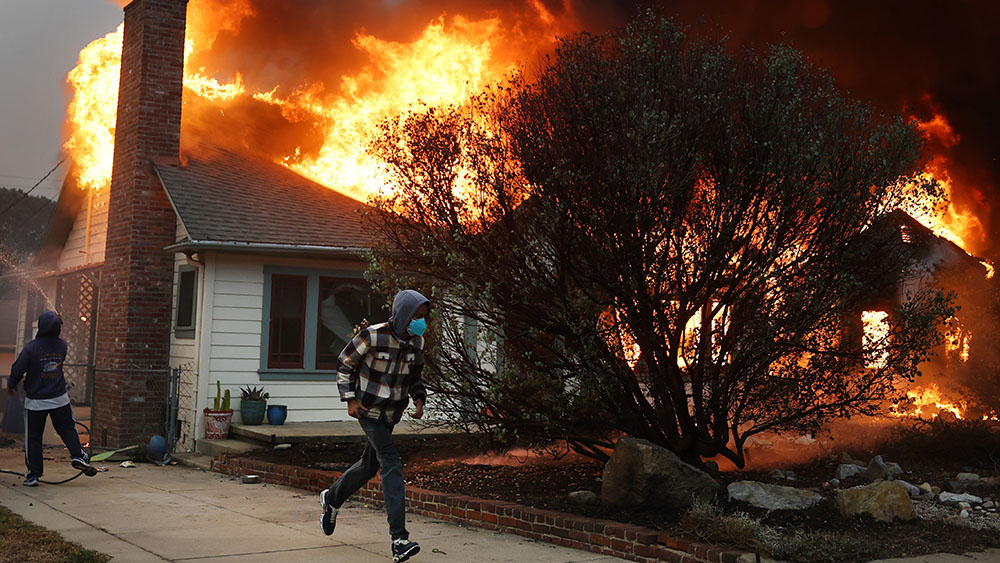- The wildfires in Los Angeles exposed significant failures in Democratic leadership, with Mayor Karen Bass and Governor Gavin Newsom criticized for being absent, unprepared, and prioritizing ideological policies over public safety. Bass’s decision to travel abroad during the crisis and Newsom’s environmental policies, such as draining reservoirs, were particularly condemned.
- Mayor Bass’ $17.6 million cut to the Los Angeles Fire Department’s budget, combined with dry fire hydrants and overgrown vegetation, left firefighters ill-equipped to handle the disaster. These decisions have been blamed for exacerbating the crisis and endangering residents.
- Residents and celebrities have expressed fury over the leadership’s negligence, with demands for Bass and Newsom to resign. Actress Sara Foster highlighted the mismanagement, citing high taxes, empty reservoirs, and inadequate fire prevention measures as key grievances.
- The wildfires have worsened California’s collapsing insurance market, with private insurers fleeing due to wildfire risks. Nearly 500,000 residents now rely on the state’s underfunded FAIR Plan, leaving taxpayers to bear the estimated $50 billion recovery cost.
- The crisis underscores the dangers of prioritizing ideological policies over practical governance. The wildfires serve as a national warning about the consequences of leadership failures, with residents demanding leaders who prioritize safety and security over political posturing.
The devastating wildfires ravaging Los Angeles have laid bare the catastrophic failures of Democratic leadership in California, with Mayor Karen Bass and Governor Gavin Newsom at the center of the storm. As flames engulfed neighborhoods, destroyed homes, and left thousands displaced, the city’s leadership was either absent, unprepared, or utterly incompetent in the face of disaster. The crisis has exposed a pattern of misplaced priorities, reckless budget cuts, and a disregard for public safety that has left Angelenos furious and demanding accountability.
Mayor Karen Bass’s decision to travel to Ghana for a presidential inauguration, despite warnings of “critical” fire conditions, has become a symbol of her administration’s negligence. While Bass attended ceremonies in West Africa, her city was burning. Her absence during such a critical moment has drawn widespread condemnation, with residents and celebrities alike calling for her resignation. Actress Sara Foster summed up the anger in a scathing post: “We pay the highest taxes in California. Our fire hydrants were empty. Our vegetation was overgrown, brush not cleared. Our reservoirs were emptied by our governor because tribal leaders wanted to save fish. Our fire department budget was cut by our mayor. But thank god drug addicts are getting their drug kits.”
The budget cuts to the Los Angeles Fire Department (LAFD) have proven particularly disastrous. Bass initially proposed slashing $23 million from the fire department’s budget before settling on a $17.6 million reduction. These cuts, coupled with the emptying of reservoirs due to environmental policies, left firefighters ill-equipped to combat the inferno. Reports of dry fire hydrants and overgrown vegetation have only added to the outrage, as residents question whether green policies prioritized over public safety contributed to the devastation.
The mayor’s return to Los Angeles was marked by a series of embarrassing gaffes and evasions. During a press conference, Bass appeared bewildered, stumbling over her notes and failing to provide clear guidance to residents. Her refusal to answer questions from a reporter at the airport, where she stared blankly into the distance for two minutes, further underscored her inability to lead in a crisis. When pressed on her decision to cut the fire department’s budget and her absence during the disaster, Bass offered no explanation or apology.
Excuses at every level of government
Governor Gavin Newsom, another prominent Democrat, has also faced criticism for his handling of the crisis. His administration’s decision to drain reservoirs to protect fish populations, despite the looming threat of wildfires, has been widely condemned as a failure of common sense. The combination of poor planning, misplaced priorities, and inadequate resources has left California vulnerable to disasters that are becoming increasingly frequent and severe due to climate change.
The wildfires have not only destroyed homes and displaced families but have also exposed a deeper crisis in California’s governance. The state’s insurance market is collapsing, with private insurers fleeing due to the high risk of wildfires. Nearly 500,000 Californians now rely on the state’s FAIR Plan, an insurer of last resort that is ill-equipped to handle the scale of potential damage. Basically, this means that California taxpayers are going to be stuck with the cost of recovery — already estimated at over $50B. This insurance crisis, coupled with the state’s inability to manage its natural resources effectively, has left residents feeling abandoned and betrayed.
The failures of Democratic leadership in Los Angeles and California are not just a local issue; they are a warning to the nation. The prioritization of ideological policies over practical governance has real-world consequences, as seen in the ashes of Pacific Palisades and other affected neighborhoods. The wildfires have revealed a leadership vacuum, where political posturing and environmental extremism have taken precedence over the safety and well-being of citizens.
As the fires continue to rage, the calls for accountability grow louder. Residents are demanding answers, and many are calling for Bass and Newsom to resign. The devastation in Los Angeles is a stark reminder that leadership matters, and when leaders fail to prioritize their constituents, the consequences can be catastrophic. The time for excuses is over; the people of California deserve leaders who will put their safety and security first. Until then, the flames will continue to burn, and the failures of Democratic leadership will remain etched in the ashes of a city in crisis.
Sources include:
DailyMail.com
Bloomberg.com
NYPost.com
Read full article here


